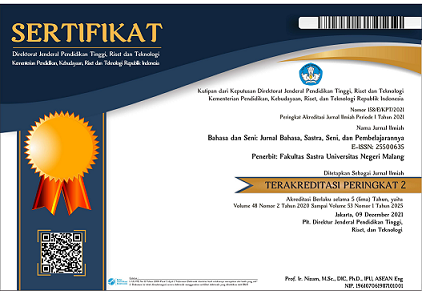PUISI INDONESIA LOMBOK: PERLAWANAN TERHADAP HEGEMONI TUAN GURU
Abstract
This paper discusses Indoesian Lombok poem as a form of resistance toward Tuan Guru (master teacher) hegemony in Lombok. In 2000s, Tuan Guru achieved hegemonic position in Lombok. This paper uses the Gramsci hegemony theory because literary work is assumed to have hegemonic power. The result shows that the conception of Islam is formed in the story of Dewi Rengganis which tells the mixture of Arabic and Lombok Islam. Arabic Islam shows the aspects of form and Lombok Islam shows the substance. Tuan Guru comes with an orthodox Arabic discourse. The poem cleverly chooses the teacher as one way to make the public believe that the ideal teacher is Tuan Guru whose knowledge goes to the prophet. The concept was strengthened through the institutions of Nahdlatul Wathan and Pondok Pesantren. This pesantren boarding school education institution has made the hegemonic position of Tuan Guru last until now. Tuan Guru's hegemony reached its peak when the customs of shoving could be standardized into Islamic law. This pesantren boarding school education institution has made the hegemonic position of Tuan Guru last until now. Tuan Guru's hegemony reached its peak when the customs of sorong serah were standardized into Islamic law. It was in this context that Indonesian Lombok poetry was present to put up a fight against the discourse Tuan Guru. Finally, The poetry sorong serah, nyongkolan and pembayun elevated the discourse of tradition in discursive formation about Lombok.
Full Text:
PDFReferences
Al-Farisi, S. (2010). Teater Cepung Lombok (Kajian Tekstual Seni Pertunjukan Lombok). Institut Seni Indonesia Yogyakarta.
Asnawi. (2005). Respons Kultural Masyarakat Sasak terhadap Islam. Ulumuna, IX(1), 1–19.
Budiwanti, E. (2000). Islam Sasak: Waktu Telu versus Waktu Lima. Yogyakarta: LKIS.
Fadjri, M. (2015). Mentalitas dan Ideologi dalam Tradisi Historigrafi Sasak Lombok pada Abad XIX-XX. Universitas Gadjah Mada.
Fadli, A. (2016). Intelektualisme Pesantren: Studi Genealogi dan Jaringan Keilmuan Tuan Guru di Lombok. El Hakim, 9 Nomor 2, 287–310.
Fahrurrozi. (2018). Tuan Guru and Social Change in Lombok, Indonesia. Indonesia and the Malay World, 0(0), 1–18. https://doi.org/10.1080/13639811.2018.1452487
Faruk. (2012). Pengantar Sosiologi Sastra: dari Strukturalisme Genetik sampai Postmodernisme (kedua). Yogyakarta: Pustaka Pelajar.
Harnish, D. (1993). The Future Meets the Past in the Present : Music and Buddhism in Lombok. Asian Music, 25(1), 29–50.
Harnish, D. (1999). Reviewed Work ( s ): Be Not Afraid to Strike the Gong : The Music of Lombok by Christopher Basile. Asian Music, 30(2), 157–160.
Hilmiyatun, & SatryaHD, D. (2015). Dewi Rengganis (Kajian Antropologi Sastra Levi-Strauss). Education, 10(2), 449–468.
Hobart, M. (1983). Reviewed Work(s): The Spell of the Ancestors an the Power of Mekkah: A Sasak Community in Lombok by Sven Cederroth. Bulletin of the School of Oriental and African Studies, 46(2), 398–399.
Jamaludin. (2011). Sejarah Sosial Islam di Lombok tahun 1740-1935 (Studi Kasus terhadap Tuan Guru).
Kingsley, J. (2011). Pelopor Perdamaian atau Perusak Perdamaian?: Pemilihan Kepala Daerah, Kepemimpinan Agama, dan Proses Perdamaian di Lombok. In A. F. Susanto (Ed.), Kegalauan Identitas: Agama, Etnisitas, dan Kewarganegaraan Pada Masa Pasca-Orde Baru (pp. 97–118). Jakarta: Gramedia.
Kristiansen, S. (2003). Violent Youth Groups in Indonesia : The Cases of Yogyakarta and Nusa Tenggara Barat. Sojourn: Journal of Social Issue in Southeast Asia, 18(1), 110–138.
Kumbara, A. A. N. A. (2008). Konstruksi Identitas Orang Sasak di Lombok Timur, Nusa Tenggara Barat. Humaniora, 23 Nomor 3, 315–326.
Macdougall, J. M. (2007). Criminality and the Political Economy of Security in Lombok. In H. S. Nordholt & G. van Klinken (Eds.), Renegotiating Boundaries (pp. 281–304). Brill.
Murahim. (2011). Ekspresi Nilai-Nilai Budaya Sasak Kemedi Rudat. Universitas Negeri Malang.
Murcahyanto, H., & Al-Pansori, M. J. (2015). Leksikon Pembentuk Tingkat Tutur Pada Upacara Adat Sorong Serah Aji Krama di Desa Sakra Kabuaten Lombokn Timur. Selong.
Nahdi, K. (2012). Nahdlatul Wathan dan Peran Modal: Studi Etnografi Historis Modal spiritual dan Sosiokultural. (S. Purnama, Ed.). Yogyakarta: Insyira.
Procter, J. (2004). Stuart Hall. London & New York: Routletge.
Safwan, I. (2014). Langit Seperti Cangkang Telur Bebek. Mataram: Akar Pohon.
SatryaHD, D., & Muttaqin, Z. (2018). Representasi Bangsawan Sasak dalam Teks Angin Alus Masyarakat Sasak. Litera, 17(1), 107–119.
Soemerep, D. A. Z. (2004). Sorong Serah, Kumpulan Puisi. (P. A. Tirtawirya, Ed.). Mataram: Asta Perdana.
Sulistyo, K. (2015). Penangkar Bekisar. Bandung: Nuansa Cendikia.
Yasin, N. (2008). Hukum Perkawinan Islam Sasak. Malang: UIN Malang Press.
Yudarta, I. G., & Pasek, I. N. (2017). Kecimol Music as Cultural Identification of Sasak Ethnic. Art and Culture, 32 Nomor 3, 314–318.
Zaelani, Kamarudin. (2005). Dialektika Islam dengan Varian Kultur Lokal dalam Pola Keberagaman Masyarakat Sasak. Ulumuna, IX(1), 48–70.
Refbacks
- There are currently no refbacks.

This work is licensed under a Creative Commons Attribution 4.0 International License.

Dear Sir/Madam
We appreciate your continued confidence and trust in Bahasa dan Seni: Jurnal Bahasa, Sastra, Seni, dan Pengajarannya (JBS). In order to enhance the service, readability, and quality of JBS publications, we will be transitioning to a new website, https://citeus.um.ac.id/jbs, in collaboration with Digital Commons (Elsevier) starting in July 2024.
Sincerely
Yusuf Hanafi
(Editor in chief)















2.png)